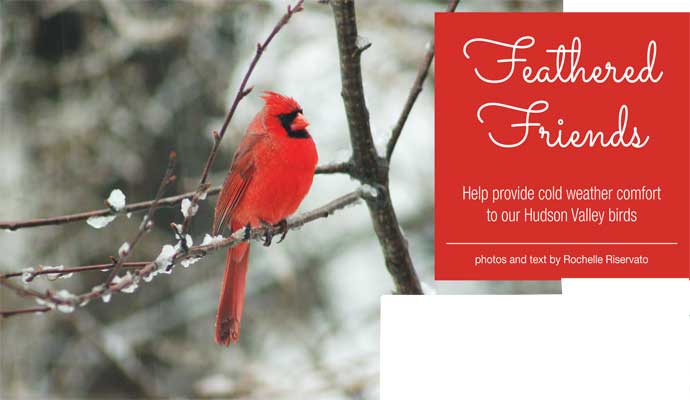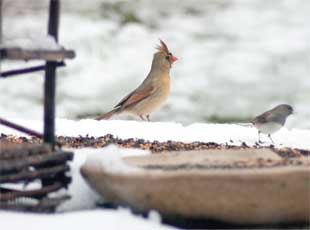Help provide cold weather comfort to our Hudson Valley birds

The life of a bird during a Hudson Valley winter is certainly not stress free. Days are short, and nights are long and cold. The natural food supply has either been consumed or hidden by snow. Insects, a staple of a bird’s diet, are dead or dormant. Water is difficult to find, and food providing much needed energy is scarce. Shelter isn’t easy to find, as trees are bare and natural evergreens may be scarce. This is when we humans need to step up and help.
“A bird does not sing because it has an answer. It sings because it has a song.” - Chinese Proverb
If you love birds... consider doing some or all on this list:

Keep feeders full.
Use black-seeded oil sunflower seeds with a high caloric ratio due to their high fat and protein content. Black sunflower has twice the calories per pound than striped sunflower, and smaller shells make less mess when discarded by the birds. Other recommended feeds are a quality mixed seed with thistle seed, safflower seed, cracked corn, mealworm, fruit, or peanut butter. If you are ambitious, try making homemade treats by stuffing peanut butter into tree bark cracks or melting suet and combining with raisins or shelled sunflower seeds.
Provide suet.
Suet is a high-energy, pure-fat substance that contributes to body warmth. A variety of suet feeders exists in local stores, and some are even designed to require birds to eat upside down.
Supply a water source.
Birds need a water source, as dehydration can be a bigger threat to birds than starvation. Water is not only important for hydration, but it also helps birds preen their feathers. Without proper preening, birds' feathers won't stay positioned and aligned. Feathers out of alignment in winter create gaps in insulation, which makes birds lose body heat faster. A birdbath or plastic dish is only useful if heated or if using proper birdbath de-icers. Otherwise, put out a receptacle of water in the warmest area possible, and replace as needed.
Keep feeders clear.
Clear snow from feeding ports and off of platform feeders. Feeders should be cleaned in the winter just as often as in summer. Use a mild disinfectant solution, such as one part bleach or vinegar to nine parts water
Offer protective cover.
Roosting boxes or natural plant covers aid birds from cold weather. Shelter is also needed for protection against natural predators, such as birds of prey, and serves as an escape for our precious songbirds. Be sure to clean out old nests from houses to help reduce the possibility of parasitic bugs surviving the winter.
Place feeders strategically.
Feeders should be located out of the wind on the east or southeast side of a house or near a row of trees. It’s ideal to be placed near a perching spot, such as a bush or tree, for birds to survey the feeding area for danger of predators. For ground feeding, an area near cover with a clear view of the surroundings is desirable.
According to New York State and federally licensed wild bird rehabilitator and educator Annie Mardiney, there is help available for birds if you happen to find one that appears sick or orphaned. For more information, visit dec.ny.gov/animals/83977.html or call the Environmental Conservation Officers dispatch line at 1-877-457-5680.

